Haiti: Creole Spoken, Creole Understood
By Dady Chery
Haiti Chery
Theories vary about the genesis of Haitian Creole (also called Kreyòl). The most plausible one is that Taino Indians and West Africans, who had evaded slavery together on Haiti’s mountains, probably intermarried and developed a new language. The name Haiti (Ayiti) itself is an Arawak word that means mountainous land. On the other hand, the word Vodou is from Benin and means God — not the God of Christianity, Muslim and Judaism created in man’s image, but a god that is indescribable, utterly inaccessible and supremely indifferent to human affairs.

Locations where the Fon language family is spoken, and the languages in that family (Source: Wikipedia).
The African Fon language family supplies much of the Creole grammar, but the lexicon is a mixed bag of African (Fon, Wolof, Kongo, Arabic), American (Arawak), and European (Spanish, English, Portuguese).
|
For historical and cultural reasons, the meanings of many words have changed from the original. For example, the word “Creole” itself is derived from the Portuguese “crioulo,” and its formal — long lost — meaning is a person of Portuguese origin who resides in the colonies. Likewise, the French words that populate the Creole lexicon have undergone differences in pronunciation, structure, and meaning. For example, the French “ce nègre” (this black man), changes in Creole to “nèg sa” and simply means “this man,” because, you see, in Haiti where we are black, and we have actually fought and won a war against racism, a black person is the definition and reference for human.
How long has Creole existed? The oldest example of a text in Haitian Creole dates from 1785. It is book by Justin Girod de Chantrans titled Voyage d’un Suisse dans différentes colonies d’Amérique. The passage in Creole is typical of colonial soft pornography: a letter in which a slave woman describes her rape by a man, apologizes to her lover for it and swears to him her undying fidelity.
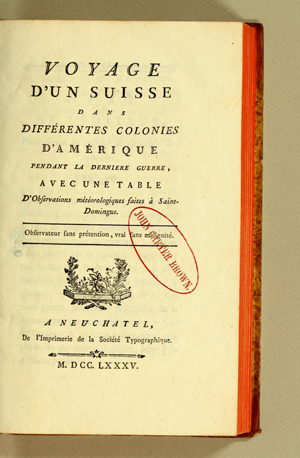 Creole was certainly the tongue spoken at the 1791 Bwa Cayiman Vodou ceremony that launched the Haitian Revolution. Nevertheless, it was French that served as the text of Haiti’s Independence Declaration and as the country’s only official language until 1987. Why?
Creole was certainly the tongue spoken at the 1791 Bwa Cayiman Vodou ceremony that launched the Haitian Revolution. Nevertheless, it was French that served as the text of Haiti’s Independence Declaration and as the country’s only official language until 1987. Why?
At least two issues prevented Creole from becoming an official language alongside the French. First, Creole was characterized as a bastardization of French and put down as a patois until 1961, when the work of Félix Morisseau-Leroy and others led to its formal recognition as one of 11 romance languages. Second, written Creole did not become standardized until 1979 (by the Institut Pédagogique National d’Haiti).
Thus, for nearly two centuries, a selective use of language led to the exclusion of the majority of Haitians from all popular debate in a largely agrarian country where no more than 10% received a formal education or ever spoke French. Most Haitians could not afford an education, but those who could fluently spoke French because all schooling was done in French, and students were forbidden from speaking a word of Creole on their school grounds. Many of these practices continue today. Indeed, the mastery of French by educated Haitians is typically commensurate with their level of schooling, and informal tests of conversational French are often used in Haiti to gauge a person’s wealth and education.
|
About 12 million Haitians at home and abroad speak Creole. By contrast, only around one million Haitians speak French. The notion that it is right and proper to address large Haitian audiences in Creole is gradually catching on. This idea started about 30 years ago when Haiti’s writers, educators, and journalists began to publish, teach, and inform the population in its native tongue. A major event in the mid-1970’s was the publication of the novel Dezafi by Haitian writer and playwright Franketienne. The novel is written entirely in Creole and is acknowledged as a masterpiece of literature. Today Creole is a routine language of Haitian television and radio news broadcasts.
As a language born of revolution, it is fitting that Creole’s official acceptance came from the February 1986 rebellion that ousted Duvalier and the subsequent broad popular discussions that produced, alongside a French version, the first major national document in Creole: the 1987 Constitution. In 1991, Creole formally became Haiti’s official language through legislation introduced by President Jean-Bertrand Aristide.
Earlier this year, the 1987 Constitution was illegally amended in the French but not the Creole version. Measures, such as the elimination of popularly elected mayors, municipal judges, Supreme Court justices and their replacement with presidential appointees, have been adopted so as to concentrate power in an executive that might be more easily bought. Thus Haiti currently has two constitutions: one for the rich, another for the poor. The poor, of course, are not fooled.
|
For free resources for learning Haitian Creole, go here.
Sources: Haiti Chery

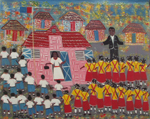
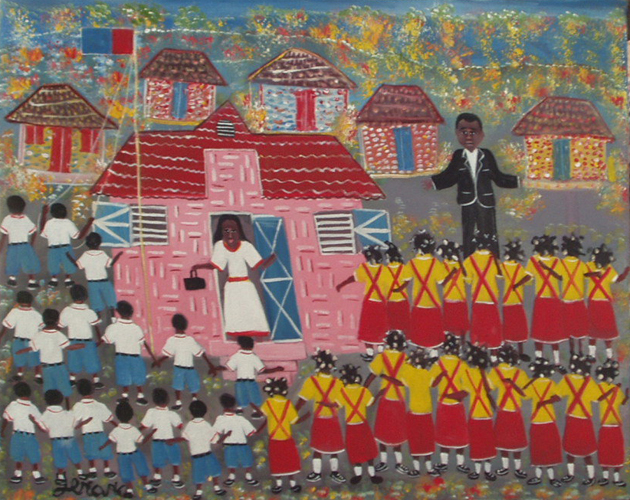

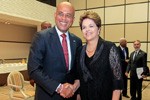



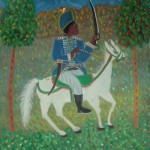
Comments
Haiti: Creole Spoken, Creole Understood — No Comments